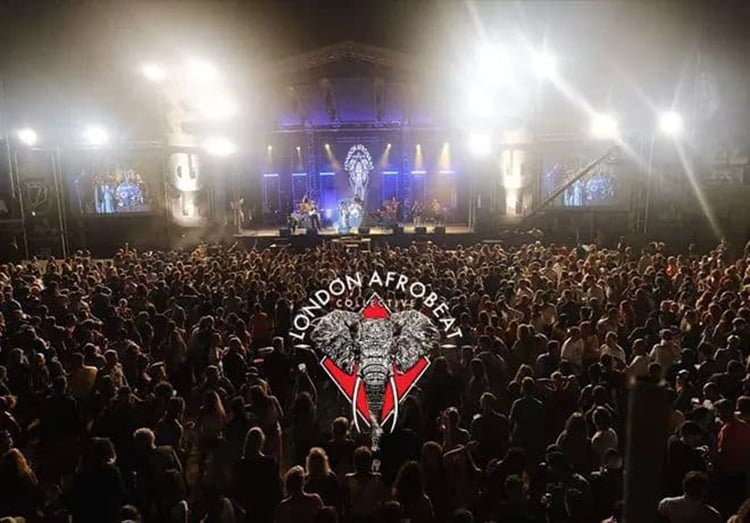Ten years on from their inception, the high impact band that is London Afrobeat Collective are about to release their third album, Humans (for which they’ve given life to an ongoing crowdfunding campaign on Indiegogo). It is probably also their most ambitious to date, exhibiting as it does something of a departure from the conventions of the genre. In speaking with baritone sax player, Klibens Michelet, I sought to find out more.
Michelet joined the group seven years ago, some three years after guitarist Alex Farrell had set up a covers band comprised of up to thirty members, many of whom had responded to an ad on Gumtree. Over time, players came and went, numbers dwindled, and today we bear witness to a fiery nonet who are all about the party and having fun.
Over the years, LAC began to take themselves more seriously, moving away from being solely a covers band, and entering both studio and auditorium armed with a growing catalogue of original songs. “It’s a strange process. We tend to go with the flow,” says Klibens, whilst still asserting the need for the musicians to be stimulated. He points out that the work that is done in the studio, whilst providing something to look back on as a marker in their journey, primarily serves to drive the wheels of their live shows. “Recordings are part of the process to get to the end.” As a live band, they are absolutely high energy, and this energy exists beyond the stage. It exists in their jam sessions, it exists on their tour bus and it most certainly exists within Humans. “It’s not even afrobeat anymore,” Klibens adds, acknowledging the pushing of the boundaries. Energy also exists in the broadening of horizons and musical exploration.
LAC didn’t just want to be yet another Fela Kuti tribute band. There are more than enough of those to go round. So, the quest, the process of moulding their own identity and personality, is very much connected with where they are, both spiritually and geographically. “We take afrobeat and we make it London,” says Klibens. Citing the gritty rock and punk scenes born out of London and their influence, he goes on to add, “We have have a stronger western vibe. We embrace that. We’re less exotic than a lot of bands.”
As with much music with strong roots in urban, inner-city life, from punk to grime, there tends to be a natural bent with regard to taking a political stance. ‘Prime Resources’, one of the standout tracks on Humans, carries a powerful message of the ongoing destruction of the Congo in the name of “feeding our greed”. As Klibens says, “It’s about realising that we’re all part of the problem, not the solution,” but also that, “We can do something about it”. The mobile phones, being used by audience members to record the moment, contain precious minerals, mined by children in the Congo. The audience caught up in the euphoria of the music, are also guilty of contributing to a bizarre paradox.
Humans has a lot to offer as an album. The afrobeat has been tempered with elements of folk, jazz, rock and its closest relative, funk. The writing process had been interrupted by a call from the people at London’s Jazz Café for LAC to take part in a P-Funk celebration; a welcome distraction considering their love of George Clinton. However, it also provided an extra dimension in their creative process, as it “seeped into the writing”. As the reclusive British artist William Green once said, “The accidental is a great bonus”. LAC embraced this intervention, and this record will now lead them further along the path on their journey, as gig after gig enhances their reputation as purveyors of high-energy party music.
“The aim is for good gigs, not necessarily many,” Klibens says. Quality, not quantity.
Listening to Humans certainly whets the appetite, making sure you get along to see their show. As with Fela, they thrive when they’re live.


